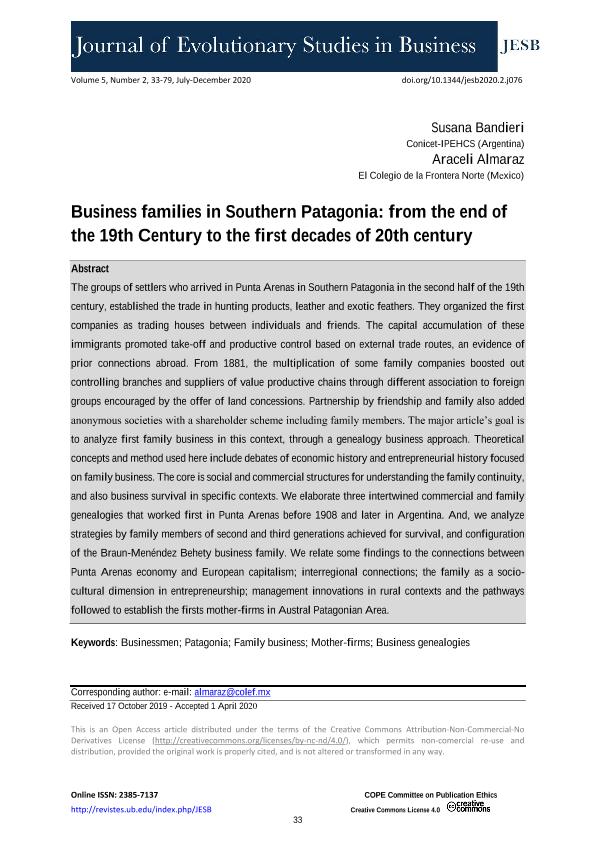Mostrar el registro sencillo del ítem
dc.contributor.author
Bandieri, Susana Ofelia

dc.contributor.author
Almaraz, Araceli
dc.date.available
2021-10-26T13:02:39Z
dc.date.issued
2020-07
dc.identifier.citation
Bandieri, Susana Ofelia; Almaraz, Araceli; Business families in southern patagonia: From the end of the 19th century to the first decades of 20th century; Universitat de Barcelona, Facultad de Economia y Empresa; Journal of Evolutionary Studies in Business; 5; 2; 7-2020; 33-79
dc.identifier.issn
2385-7137
dc.identifier.uri
http://hdl.handle.net/11336/145044
dc.description.abstract
The groups of settlers who arrived in Punta Arenas in Southern Patagonia in the second half of the 19th century, established the trade in hunting products, leather and exotic feathers. They organized the first companies as trading houses between individuals and friends. The capital accumulation of these immigrants promoted take-off and productive control based on external trade routes, an evidence of prior connections abroad. From 1881, the multiplication of some family companies boosted out controlling branches and suppliers of value productive chains through different association to foreign groups encouraged by the offer of land concessions. Partnership by friendship and family also added anonymous societies with a shareholder scheme including family members. The major article’s goal is to analyze first family business in this context, through a genealogy business approach. Theoretical concepts and method used here include debates of economic history and entrepreneurial history focused on family business. The core is social and commercial structures for understanding the family continuity, and also business survival in specific contexts. We elaborate three intertwined commercial and family genealogies that worked first in Punta Arenas before 1908 and later in Argentina. And, we analyze strategies by family members of second and third generations achieved for survival, and configuration of the Braun-Menéndez Behety business family. We relate some findings to the connections between Punta Arenas economy and European capitalism; interregional connections; the family as a socio-cultural dimension in entrepreneurship; management innovations in rural contexts and the pathways followed to establish the firsts mother-firms in Austral Patagonian Area.
dc.format
application/pdf
dc.language.iso
eng
dc.publisher
Universitat de Barcelona, Facultad de Economia y Empresa
dc.rights
info:eu-repo/semantics/openAccess
dc.rights.uri
https://creativecommons.org/licenses/by-nc-nd/2.5/ar/
dc.subject
BUSINESS GENEALOGIES
dc.subject
BUSINESSMEN
dc.subject
FAMILY BUSINESS
dc.subject
MOTHER-FIRMS
dc.subject
PATAGONIA
dc.subject.classification
Historia

dc.subject.classification
Historia y Arqueología

dc.subject.classification
HUMANIDADES

dc.title
Business families in southern patagonia: From the end of the 19th century to the first decades of 20th century
dc.type
info:eu-repo/semantics/article
dc.type
info:ar-repo/semantics/artículo
dc.type
info:eu-repo/semantics/publishedVersion
dc.date.updated
2021-08-25T19:23:55Z
dc.identifier.eissn
2385-7137
dc.journal.volume
5
dc.journal.number
2
dc.journal.pagination
33-79
dc.journal.pais
España

dc.journal.ciudad
Barcelona
dc.description.fil
Fil: Bandieri, Susana Ofelia. Universidad Nacional del Comahue. Instituto Patagónico de Estudios de Humanidades y Ciencias Sociales. Consejo Nacional de Investigaciones Científicas y Técnicas. Centro Científico Tecnológico Conicet - Patagonia Norte. Instituto Patagónico de Estudios de Humanidades y Ciencias Sociales; Argentina
dc.description.fil
Fil: Almaraz, Araceli. El Colegio de la Frontera Norte; México
dc.journal.title
Journal of Evolutionary Studies in Business
dc.relation.alternativeid
info:eu-repo/semantics/altIdentifier/doi/https://doi.org/10.1344/jesb2020.2.j076
dc.relation.alternativeid
info:eu-repo/semantics/altIdentifier/url/https://revistes.ub.edu/index.php/JESB/article/view/j076
Archivos asociados
